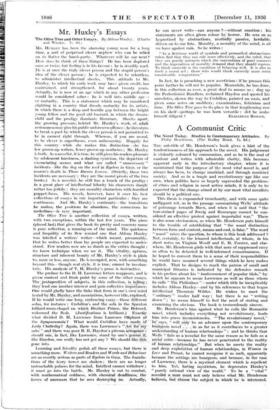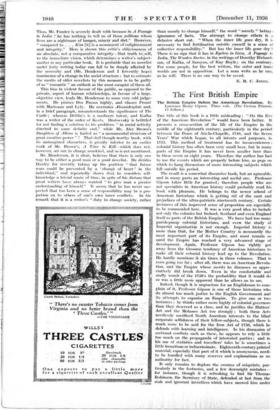The Novel Today. Studies in Contemporary Attitudes. By Philip Henderson.
(The Bodley Head. 7s. Bd.)
A Communist Critic
The Novel Today. Studies in Contemporary Attitudes. By Philip Henderson. (The Bodley Head. 7s. Bd.) THE sub-title of Mr. Henderson's book gives a hint of the tendentiousness of his approach to the novel. His judgement is violently coloured by communism, and as he is the Soul of candour and writes with admirable clarity, this becomes apparent early in the introductory chapter, where it is maintained that the purpose of the most vital novel is, and always has been, to change mankind, and through mankind society. And so in a tragic and revolutionary age like our own, when politics have so largely superseded the problems of ethics and religion in most active minds, it is only to be expected that the change aimed at by our most vital novelists should be a political one.
This thesis is expounded trenchantly, and with some quite unflippant wit, as in the passage summarising Wells' attitude of patronage towards Marx, and when it is said that "the tear-stained pages of Zweig and Remarque cannot be _con- sidered an effective protest against imperialist war." There is also some obviousness, as when Mr. Henderson puts himself to the trouble of establishing that "the usual distinction between form and content, means and end; is false." -The Word "usual" raises the question, to whom is this book addressed ? Not, certainly, to the leisured intellectuals, at whom, in his short notes on Virginia Woolf and E. M. Forster, and else- where, Mr. Henderson girds with that note of suppressed envy so often to be detected in 'Well-informed censoriousness. If he hoped to convert them to a sense of their responsibilities he would have assurned several things which he here makes explicit. That he designs to reach the patron of small and municipal libraries is indicated by the defensive remark in his preface about his " bouleversernent of popular idols," -by which he appears to mean Lawrence as well as those whom he calls "The Philistines "—under. which title he inexplicably includes_ Aldous Huxley—and by his references to that bogus iiitellectUal Thornton Wilder. He wishes to meet the " ordinary " reader half way ; but there is no "writing down " ; he seems himself to feel the need of stating and examining the obvious. The book is treMendously sincere.
Mr. Henderson' S bias against what he calls, the Romantic. novel, which includes everything not revolutionary, leads him into grave inconsistencies. "The revolutionary novel,". he- says, "will oüly he an advance upon the contemporary • _bE4rgeois novel in so far as it contributes to a greater understanding of human relationships " ; and he thinks that Wells "fails as a novelist for the same reason as he fails as a social Critic—because he has never penetrated to the -reality Of "raglan relationships." But when he meets the reality . and deep explaation of human relationships, in Women in Lore and Proust, he cannot recognise it as such, apparently ..because the settings are bourgeois, and because, in the case of Lawrence, there is a imystical element which is repellent to him. Yet, hating mysticism, he deprecates Huxley's "purely rational view of the world." To be a " vital " novelist a :rnah must not only believe what Mr. Henderson believes, but Choose the subject in which he is interested. Thus, Mt. Forster is severely dealt with because in A passage So India 1' he has nothing to tell us of those_millions whose lives are a nightmare of hunge-r,-Shis-erY and dirt.". However, "compared to . . . Kim lit] is a monunient-of enlightenment and integrity." Here Is shown this critic's obliviousness of an absolute; hot ,a-coinparative integrity—that truth -toiself, to the immediate vision, -which determines a writer's subject- matter in any particular book. it is probable that no novelist under forty writing today can fail to be deeply affected._by the necessity and (Mr. Henderson and I fervently _hope) imminence Of a change in the social structure ; but to estimate the merits of. older novelists by this measure is to be guilty of as " romantic" an outlook as the most escapist of them all.
This bias in violent favour of the public, as opposed to the private, 'aspect of human relationships, in favour of a large, objective view, leads Mr. Henderson to some very odd judge- mentS._ He praises Dos Passos highly, and classes Proust with Marivaux and Lyly. He overrates Alexaraderplatz and, in a brief paragraph, misunderstands the significance of The Castle ; whereas DOblin's is a mediocre talent, and Kafka was a writer of the order of Keats. DostoevskY is belittled for not finding "a-solution to his problems "in social activity direeted to some' definite end," while Mr. Alec Brown's Daughters of Albion is hailed as " a monumental strtieture of great creative power 7 ! That dull though worthy book, with its unimakined characters, is greatly inferior to an earlier work. of Mr. Brown's, A 'Time to Kilt—which does not, however, set out to change mankind, and so is not mentioned. Mr. Henderson, it is Clear, believes that there is only one way to be either a good maii or a good novelist. He derides Huxley fcir recently taking up the position "that future wars. could be prevented by a change of heart' in the and repeatedly shows that he considers 'self- knowledge a trivial waste of time, in spite of his dictuni that great writers have always wanted "to Five - man a greater underitanding of himself." It seems that he has never sus- pected that too keen a sense of responsitiility may be 'a pro- jection on to others or one's own inner conflicts. In his remark that it is a writer's "duty to change society, rather than merely to change himself," the word "Arierely." 'betrays ignorance of facts. The attempt to change others is a delusive short cut. "When the inner life goes dry, it is necessary to find fertilisation outside oneself in a sense of collective responsibility." But has the inner life gone dry ? There is no sign that it has in Eyeless in Gaza, A .Papage to India, The Wooden Doctor, in the writings of Dorothy Richard- son, of Kafka, of Saroyan, of Kay Boyle ; on the contrary. For some people, for the best writers, the outer and inner worlds are not in opposition. Let a man write as he can, as he will. There is no one way to be saved.
E. B. C. JONES.

















































 Previous page
Previous page